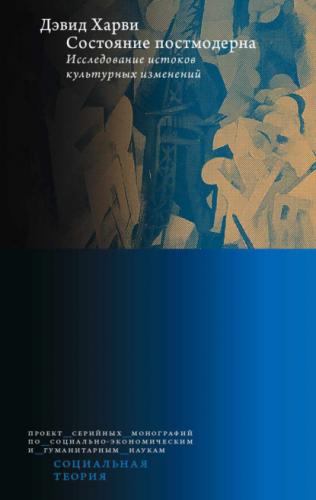Харви Д. 2011. Пространство как ключевое слово // Топос. № 1.
Харви Д. 2018. Социальная справедливость и город. М.: Новое литературное обозрение.
Харви Д. 2020. Маркс сегодня актуальнее, чем когда-либо // Commons. [Электронный ресурс]. URL: <https://commons.com.ua/ru/karl-marks-polezen-dlya-nashego-vremeni/>.
Хардт М., Негри A. 2004. Империя. М.: Праксис.
Anderson Р. 1998. The Origins of Postmodernity. London: Verso.
Berman M. 1982. All that is solid melts into air: The experience of modernity. New York: Simon and Schuster.
Callinicos A. 1990. Against Postmodernism: A Marxist Critique. New York: St. Martin’s Press.
Callinicos A. 2006. David Harvey and Marxism // David Harvey: A Critical Reader / N. Castree, D. Gregory (eds). Malden; Oxford; Carlton: Wiley-Blackwell.
Dean J. 2009. Democracy and other neoliberal fantasies. Communicative capitalism and left politics. Durham; London: Duke University Press.
Deutsche R. 1991. Boys town // Environment and Planning D: Society and Space. No. 9.
Eagleton T. 1996. The Illusions of Postmodernism. Malden; Oxford; Carlton: Blackwell Publishing.
Fuchs C. 2020. Communication and Capitalism: A Critical Theory. London: University of Westminster Press.
Gregory D. 2006. Introduction: Troubling Geographies // David Harvey: A Critical Reader / N. Castree, D. Gregory (eds). Malden; Oxford; Carlton: Wiley-Blackwell.
Hartsock N. 2006. Globalization and Primitive Accumulation: The Contributions of David Harvey’s Dialectical Marxism // David Harvey: A Critical Reader / N. Castree, D. Gregory (eds). Malden; Oxford; Carlton: Wiley-Blackwell.
Harvey D. 1982. The Limits to Capital. Oxford and Chicago, IL: Blackwell and University of Chicago Press.
Harvey D. 1985a. Consciousness and the Urban Experience. Oxford: Blackwell and Baltimore, MD: Johns Hopkins University Press.
Harvey D. 1985b. The Urbanization of Capital. Oxford: Blackwell and Baltimore, MD: Johns Hopkins University Press.
Harvey D. 1992а. The Condition of Postmodemity: An Enquiry into the Origins of Cultural Change. Oxford: Blackwell.
Harvey D. 1992b. Postmodern morality play // Antipode. 1992. Vol. 24. No. 3.
Harvey D. 1997. Justice, Nature and the Geography of Difference. Malden; Oxford; Carlton: Wiley-Blackwell.
Harvey D. 2001a. Reinventing geography: An interview with the editors of New Left Review // Harvey D. Spaces of Capital: Towards a Critical Geography. Edinburgh; New York: Edinburgh University Press; Routledge.
Harvey D. 2001b. Spaces of Capital: Towards a Critical Geography. Edinburgh; New York: Edinburgh University Press; Routledge.
Harvey D. 2001c. Militant particularism and global ambition: The conceptual politics of place, space, and environment in the work of Raymond Williams // Harvey D. Spaces of Capital: Towards a Critical Geography. Edinburgh; New York: Edinburgh University Press; Routledge.
Harvey D. 2003а. The New Imperialism. Oxford: Oxford University Press.
Harvey D. 2003b. Paris, Capital of Modernity. New York: Routledge.
Harvey D. 2010. The Enigma of Capital and the Crises of Capitalism. New York: Profile Books.
Harvey D. 2013. The Ways of the World. London: Profile Books.
Harvey D. 2014. Seventeen Contradictions and the End of Capitalism. New York: Profile Books.
Harvey D. 2020. The Anti-Capitalist Chronicles. London; Sterling; Virginia: Pluto Press.
Harvey D., Merry M. 1972. People, Poverty and Wealth. Glasgow: Collins Certificate Topics in Geography.
Hassan R. 2020. The Condition of Digitality: A Post-Modern Marxism for the Practice of Digital Life. London: University of Westminster Press.
Jameson F. 1998. The Cultural Turn. Selected Writings on the Postmodern. 1983–1998. London; New York: Verso.
Jameson F. 2000. Globalization and Political Strategy // New Left Review. No. 4.
Jameson F., Miyoshi M. (eds). 1998. The Cultures of Globalization. Durham; London: Duke University Press.
Keucheyan R. 2013. The Left Hemisphere: Mapping Critical Theory Today. London: Verso.
Laclau E., Mouffe C. 2000. Hegemony and Socialist Strategy. London: Verso.
Massey D. 1991. Flexible Sexism // Environment and Planning D: Society and Space. No. 9.
McHale B. 2015. The Cambridge Introduction to Postmodernism. Cambridge: Cambridge University Press.
Mitchell J. 1984. Women: The Longest Revolution. London: Virago.
Morris M. 1992. The Man in the Mirror: David Harvey’s “Condition” of Postmodemity // Theory, Culture and Society. No. 9.
Susen S. 2015. The “Postmodern Turn” in the Social Sciences. Houndmills; Basingstoke; Hampshire: Palgrave Macmillan UK.
Wayne M. 2003. Marxism and Media Studies. Key Concepts and Contemporary Trends. London; Sterling; Virginia: Pluto Press.
Wegner P.E. 2009. Life between Two Deaths, 1989–2001: U. S. Culture in the Long Nineties. Durham: Duke University Press.
Wright M. 2006. Differences that Matter // David Harvey: A Critical Reader / N. Castree, D. Gregory (eds). Malden; Oxford; Carlton: Wiley-Blackwell.
Основные тезисы
Примерно с 1972 года в культурных, а также в политико-экономических практиках произошли глобальные перемены.
Эти перемены неразрывно связаны с возникновением новых главенствующих способов переживания нами пространства и времени.
Хотя одновременность в смещении измерений времени и пространства не является доказательством необходимой или причинно-следственной взаимосвязи между ними, можно представить веские априорные
